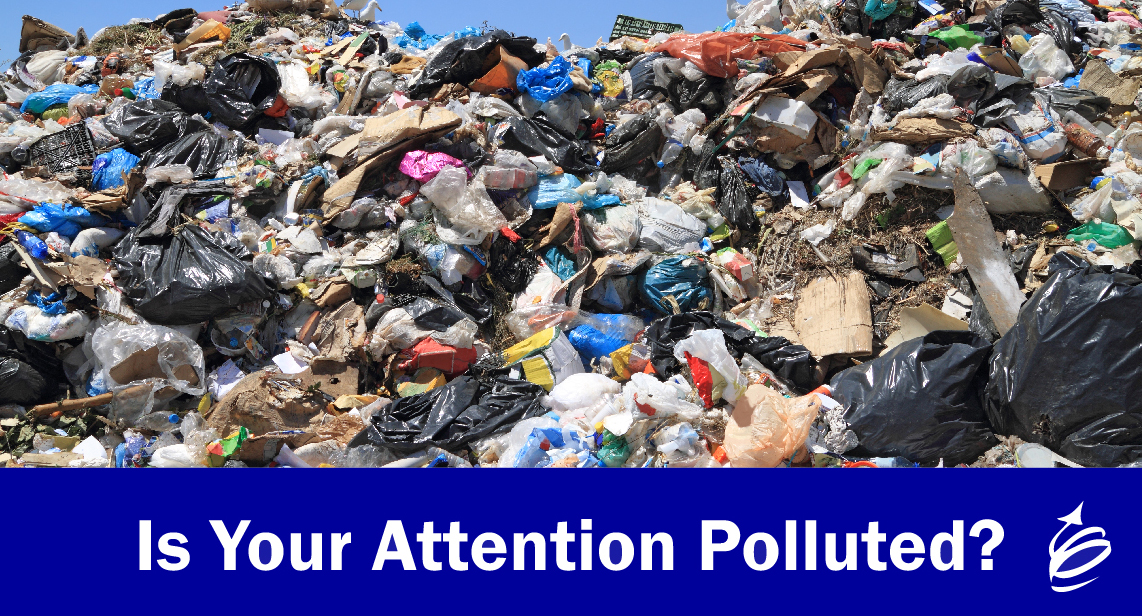 From the time most of us were young, we have been aware of pollution; we’ve seen public service announcements and news stories about the pollution of the air and the water. We see trash along the sides of the road.
From the time most of us were young, we have been aware of pollution; we’ve seen public service announcements and news stories about the pollution of the air and the water. We see trash along the sides of the road.
There is little doubt that pollution is a problem.
I’m not talking about those common types of pollution today. I’m being more personal and direct. I believe your attention is polluted. And at least in an immediate way, it is likely more important than any other type of pollution you experience in your life.
Several weeks ago I heard or read (I think) the term attention pollution. I was immediately captured by the idea and have been thinking about it ever since I planned to write about it this week. But in my quick research, I can’t find where I read the phrase, and Google wasn’t helpful either. So, while I wanted to properly attribute the phrase, now I can’t find it anywhere else.
Note – if you have a reference to its use and can point me to it – please do so and I will adjust this article!
Perhaps I coined it, unknowingly, but it’s origin as a phrase matters less than the impact it is having on all of our lives. Attention Pollution.
Attention
Our attention is something that is completely ours, and despite your protestations that you can multitask, the research is clear and definitive that we really can’t multitask. Our brains can switch between tasks quickly and while we feel we are doing “two things at once”, we are really, at the very best, doing each of them at 70% of our capacity.
And our attention is among our most valuable possessions – our attention allows us to think, learn, solve problems, make memories, show gratefulness and love and much more.
Pollution
When I searched on the definition of the word pollution, I found: “the presence in or introduction into the environment of a substance or thing that has harmful or poisonous effects.” The definition makes sense to me and applies completely to our attention too, doesn’t it?
Attention Pollution
Here is a short list of what is polluting/poisoning your attention. (Feel free to add your own items and/or details to this list.)
- Other people
- Phone calls
- The radio (or streaming music service)
- Your latest or favorite playlist
- The television (or Netflix, or Hulu, or your DVR, or YouTube)
- The latest news story/catastrophic event
- Text messages
- Your cell phone (in general)
- The beeps, buzzes, and notifications on any of your devices
- Social media
- Your favorite app(s)
- The internet (in general)
It is clear that the negative personal impacts of attention pollution are at least as dire as the pollution in our air or water. Yet, we seem to largely ignore these, or call these polluters “progress.” I’m neither a technophobe nor an extreme environmentalist. I care about the purity of our air and water, and I care about the purity of my attention too. Of course there are trade-offs that come with some of the industries and situations that are impacting our natural resources – and the same is true with the technologies and advances that are impacting our attention.
The pollution I am describing here is subtler than some trash on the side of the road or an obvious spill in the water. And in most all of these situations you could say these aren’t polluters, but enhancers to our lives. Certainly a distraction of a loved one diverting our attention might not be seen as “pollution.”
But not all distractions are created equal; and when the number of and number of sources of distractions grows to the point that we seldom (never?) have time to stop and think about important (or even random) things in our lives, it has long term and unforeseen effects on our life, our health and our success. Let me be direct:
When do you stop and think?
When do you reflect on your day, year, choices or life?
If you don’t like your answers; it’s time to consider what is polluting your attention. And it is time to take responsibility for guarding your attention with the fervor it deserves.
I opened by saying that through a variety of means we have become quite aware of several types of pollution; and that awareness begins to create change. This article is meant to create a new awareness and perhaps some new language for you. Your attention is valuable, and it is polluted.
If you find your attention is polluted more than you’d like, the choices are yours. The “clean up” in your hands.

Great article. An approach to managing attention pollution is to focus on intention. Intention + attention leads to skillful practice at whatever it is you are doing.
Thanks Chris! Intention is key to our success here as you said.
Kevin:)
Dear Sir:
good article matching this age challenge if being focused within everything in life.
in fact, i am in management level in my company,and i have big debate with some managers on multitasking concept.
my view that multitasking is a source of distraction and will lead to non excellennt achievements,but for them they say NO,in this fast age all employees should do multitasking to save resources and catchup with daily progress in every field.
Anyway,if you could refer me to the study of multitasking effect,it would be great.
thanks&you are Remarkable 🙂
Mohammed – Thanks for the note. I’d start with this excellent book – The Myth of Multitasking by Dave Crenshaw – http://www.amazon.com/gp/product/0470372257/ref=as_li_tl?ie=UTF8&camp=1789&creative=390957&creativeASIN=0470372257&linkCode=as2&tag=k0cca-20&linkId=G6V6ZWVLVZVFXB3C
Kevin 🙂